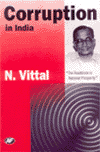|
|
| |
BOOK
REVIEW
Mammon's
cesspool
Corruption in India by N
Vittal
Reviewed by Sreeram Chaulia
"In the end, your integrity is all
you've got."
- Jack Welch, ex-CEO of General
Electric
 No
Indian was better situated to attempt a
holistic and comprehensive swipe at the
gangrene of corruption than N Vittal, the
enterprising and erudite former central
vigilance commissioner. His innovative
functioning style and urgency in office won
plaudits from concerned citizens and the
media. No
Indian was better situated to attempt a
holistic and comprehensive swipe at the
gangrene of corruption than N Vittal, the
enterprising and erudite former central
vigilance commissioner. His innovative
functioning style and urgency in office won
plaudits from concerned citizens and the
media.
This volume is a compendium of information on
the extent to which India has fallen into
mammon's cesspool and the ways out of it.
Vittal's reputation as a repository of
creative ideas and alternative thinking is
fully validated in a short yet significant
book addressing a gargantuan problem.
Corruption in India has reached a stage where
even for getting legitimate rights satisfied,
citizens have to bribe public servants. The
culture of graft has become so all-pervasive
that Indians accept it as an inevitable fact
of life. Resigned cynicism and numbness to
corruption are widespread, with issues such as
food-grain prices, drinking water, shelter and
employment counting higher in voter priorities
than the mother of all maladies.
Tracing the social roots of corruption, Vittal
observes a strong rationale for dishonesty in
the organization of Indian society along caste
and kinship lines. Extreme attachment of
people to families and extended relatives
breeds nepotism. Basic tolerance and
individualism of Hinduism allow amassment of
wealth without questioning the means of
accumulation. The dowry system, donations for
school admissions and the spreading cult of
consumerism are other social evils that
encourage moral turpitude. At the systemic
level, Indian democracy itself is "based
on corruption because all political parties
have to collect funds in cash, which is black
money". (p 23) An abysmal 6 percent
conviction rate in criminal courts allows
corruption to be a low-risk, high-profit
business.
Globalization is uncovering the costs of
corruption as never before. Southeast Asian
tiger economies, which rode the globalization
wave, lacked proper corporate governance in
the financial sector and collapsed by
mid-1997.
Vittal categorizes different types of costs
imposed by corruption. First, there are lost
revenues from customs, excise, taxation,
privatization etc.
Second, corruption reduces productive
investment and growth. Multinational
corporations are pursuing criminal courses to
win contracts in emerging markets. By adding
top-ups to the cost of production,
"government interaction costs"
render exports non-competitive.
Third, corruption costs the public, and the
poor in particular, by tearing their small
savings to shreds.
Fourth, corruption negates the rule of law,
sanctity of contracts and the legitimacy of
the state.
A fifth cost is financial terrorism and money
laundering by transnational fundamentalist
networks. The RDX that killed so many people
in the Mumbai serial bomb blasts of 1993 was
smuggled into India by bribing customs
officials. The same modus operandi was
apparently used in the attack of August 25
this year.
Economist Kaushik Basu has shown how
"faster economic growth is not just a
consequence of appropriate economic policy,
savings rate, human capital and fiscal
deficits, but the level of honesty in the
citizenry". (p 30) In South Asia, where
515 million people are in abject poverty,
combating corruption amounts to saving human
lives, since corruption "literally
snatches food away from the mouth of the
poor". (p 45) Anti-poor implementation of
pro-poor development policies is a perverse
feature of Indian administration.
Post-dirigisme (state control of
economic and social affairs) India witnessed
the shutdown of many corrupt offices of the
"license-permit quota raj". However,
disinvestment and divestment of government
monopolies in services such as
telecommunications have given rise to a series
of allegations of corruption. How transparent
and independent regulatory bodies are is an
open question. Industrialists are also fuming
about a new "inspector raj" that
enforces side payments to excise, sales and
income tax spot-checkers to "keep them
happy".
Can the rot be stemmed? Vittal's answer is a
resounding yes. Above all, the moral caliber
of individuals decides the fate of a nation.
Efficiency, truthfulness, purity of mind,
community service etc must be revived to
change the character of people. So long as
greed persists, corruption cannot be
eliminated. Those who are in a position to
extort citizens will try to maximize their
income, irrespective of legal salaries, unless
an ethical transformation occurs. "War
begins in the minds of people ... corruption
also begins in the minds of people." (p
61)
Highly corrupt India is also poorly governed.
Corruption and mal-governance go hand in hand.
To break this vicious partnership, role
clarity of the bureaucracy has to be enhanced.
If objectives of government servants are clear
and the broad approach is result-oriented, not
process-oriented, the administrative
juggernaut will start doing the right things
rather than getting the thing done rightly.
Freedom of information, granting people access
to government files, can penalize public
servants who hide or distort facts. Extensive
application of information technology is also
crucial. Computerized banking reduces the
chances of fraudulent practices. Vittal's
publication of names of senior Indian
bureaucrats facing prosecution on his office's
website raised a whole new technique of
"e-shaming" the avaricious.
Obsolete laws that cushion corrupt officials
should be removed from statute books,
following the "sunset principle" of
the United States. Downsizing the bureaucracy
and rationally redeploying manpower can
increase the velocity of government
transactions. An intense focus on productivity
can change the work ethic of Indian "babudom".
Consciously promoting a "network of
champions" from different sectors of the
Indian economy can work miracles, as was
proved when the Anand dairy cooperative
movement spread to the rest of the country
during the "White Revolution".
Indian youth today are in essence
consumer-oriented with harmful value systems.
They "know the price of everything and
the value of nothing". (p 81) Lessons in
moral science and fighting corruption must be
included in syllabi of high schools and
colleges so that the "LUCKI
generation" (labeled, urban, cool,
knocked-out Indians) grows up to shoulder
national responsibilities.
On legal and judicial control of corruption,
Vittal advises a new law that will confiscate
property and ill-gotten assets of the corrupt.
"Merely sending the corrupt holders of
public office to jail is no remedy." (p
92) A code of conduct for each
government-service cadre is essential.
Officers' associations should identify the
corrupt among them and socially ostracize the
guilty on the lines of the French police
service. Internal discipline is also needed in
the politicized, plodding and corrupt
judiciary. Managements in charge of
corporations should also undertake internal
monitoring of systems for weaknesses.
Whistleblowers in all organizations will be
encouraged if a public-disclosures act is
promulgated.
Indian administration is suffering from a
Sisyphus syndrome, thanks to tremendous cost
and time overruns on projects. A "Rubicon
point" for each project must be fixed.
Once it is crossed, there must be no going
back or renegotiation. Sensitive posts such as
prosecuting agencies like the Central Bureau
of Investigation and the Enforcement
Directorate must be immunized from political
manipulation by recruiting through objective
and independent committees and granting
minimum security of tenure to staff.
The Indian judiciary has to speed up the pace
of case disposal (at the current rate, it
might take 300 years to adjudge the pending
caseload!). Vittal proposes radically
enhancing the judicial infrastructure from the
lowest to the highest court by 150 times to
meet the case demand mountain. The entire
legal system can be approached from the point
of view of a well-run company, the bottom line
being achievement of objectives and deadlines,
not adjournments or extravagant vacations for
benches.
Prioritization of the case backlog and a
time-bound program to eliminate the deficit
might yield citizen-friendly justice. In order
to make explicit what is latent and hidden in
other provisions of the Indian constitution,
Vittal supports enactment of a fundamental
right to corruption-free service. This right
will ensure a level playing field when the
hapless citizen encounters the mighty state
machinery.
In business, accountability should be viewed
as a value-added (eg return on investment,
quality of goods and services) to
stakeholders. To avoid scams like the Enron
collapse, auditing firms should be debarred
from doing consultancy for the same clients.
Ethical check questionnaires for
decision-making can awaken "conveniently
ignorant" chief executives and managers.
Corporate and individual contributions to
political parties "must be freely
permitted and eligible for tax
deduction", provided they are put in the
public domain. The fiscal system should be
modified into a "zero exemption,
simplified, uniform, flat tax rate" to
eliminate discretionary practices. Advance
rulings on precise customs and excise duties
for each product and service will counter rent
seeking.
Vittal concludes by asserting that a
corruption-free India is possible if the
supply side is choked. "We should first
decide whether we as a people are prepared to
compromise." (p 154) Citizens who give
bribes are no less corrupt than recipients of
slush money. If it is realized that corruption
is not inexorable, intolerance for it will
rise. "Every saint has a past and every
sinner a future. Dramatic changes in the
mindset can be brought about." (p 156)
Other democratic countries have emerged from
virtually intractable depths of corruption.
The United Kingdom under William Gladstone,
Hong Kong under the 1974 Independent
Commission Against Corruption, Singapore under
Lee Kuan Yew, Botswana etc are examples of
ships being steered out of mammon's cesspools.
India's self-rescue effort is long due.
Corruption in India, by N Vittal.
Academic Foundation, New Delhi, 2003. ISBN:
81-7188-287-0. Price US$10, 188 pages.
(Copyright 2003 Asia Times Online Co, Ltd. All
rights reserved. Please contact [email protected]
for information on our sales and syndication
policies.) |
| |
|
|
 |
|
| |
|
|
|
| |
|
|
|
|
|




 No
Indian was better situated to attempt a
holistic and comprehensive swipe at the
gangrene of corruption than N Vittal, the
enterprising and erudite former central
vigilance commissioner. His innovative
functioning style and urgency in office won
plaudits from concerned citizens and the
media.
No
Indian was better situated to attempt a
holistic and comprehensive swipe at the
gangrene of corruption than N Vittal, the
enterprising and erudite former central
vigilance commissioner. His innovative
functioning style and urgency in office won
plaudits from concerned citizens and the
media.





